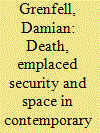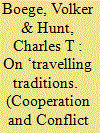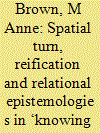|
|
|
Sort Order |
|
|
|
Items / Page
|
|
|
|
|
|
|
| Srl | Item |
| 1 |
ID:
175361


|
|
|
|
|
| Summary/Abstract |
By adopting a spatial approach to analysis, this article examines the significance of death in Timor-Leste and its relationship to security and peace. The main argument is that a person’s security in Timor-Leste is very often made possible via the sustaining of what is referred to here as ‘cognate communities’ which comprise both the living and the spirits of the ancestral dead. Grave-making as a form of ‘emplaced security’ – an expression of agency which results in the creation or transformation of a place in order to mitigate threat – enables a particular kind of space whereby the living as part of cognate communities are able to venerate their dead. In turn, engagement with the ‘spatial turn’ demonstrates how this form of emplaced security is not static, but rather is dynamic and adaptive as communities formed through custom constantly interact with broader social changes and spatial transformations. Even as grave-making represents a micro-form of emplacement, such acts both produce and respond to different spatial orders, including more abstract forms bound up with nation formation. As such, the ‘spatial turn’ shows how burial represents both an intimate and petite act of place-making while also intersecting with different spatial orders and scales that interact with meta-narratives including religion, modernisation and nationalism.
|
|
|
|
|
|
|
|
|
|
|
|
|
|
|
|
| 2 |
ID:
175363


|
|
|
|
|
| Summary/Abstract |
Important sources of everyday security – variously labelled as customary, informal, traditional or autochthonous – are commonly associated with rural spaces and attributed to the lack of presence or traction of state institutions. However, these practices are not limited to peripheries; they can travel. Their structures, authority and legitimacy can be re-produced in new settings, often in response to the perturbations caused by conflict, while also changing in the course of travel. Consequently, in urban spaces – the supposed ‘centre’ of the modern state – people’s sense of security can be profoundly influenced and shaped by the ordering logics of such ‘travelling traditions’. This has ramifications for ‘emplaced security’ – both short-term responses to acute vulnerability of displaced communities and emergent longer-term forms of order. This article explores the utility of the ‘spatial turn’ in peacebuilding theory for better understanding this phenomenon. It uses the cases of Vanuatu and Liberia to demonstrate how more nuanced understandings of the (re)construction of authority between and across places and scales may help comprehend how people generate everyday emplaced security. A spatial approach provides analytical leverage that can help to highlight how a phenomenon such as travelling traditions contributes to the formation and substance of emplaced security.
|
|
|
|
|
|
|
|
|
|
|
|
|
|
|
|
| 3 |
ID:
175359


|
|
|
|
|
| Summary/Abstract |
How we approach knowing conflict and security makes a difference. This article first considers how reification, instrumental subject/object relations and the drive for certainty and control undermine effective knowledge and practice in questions of conflict and peace. It then turns to what the spatial turn and notions of emplaced security might offer to working against violence. As with any theoretical perspective, the spatial turn can itself be reified, repeating epistemological relations entrenched in much security analysis. The spatial turn and emplaced security explicitly highlight alternative, more relational knowledge practices, however. A relational epistemology approaches knowledge not only as information about a subject out there, but also as a form of practice with others which changes conditions of possibility for co-existence. If pursued, such approaches could help loosen the grip of narrow constructions of security, insecurity, the person, power and agency which dominate security analysis and obstruct understanding and the generation of alternatives in situations of entrenched conflict. An orientation to place could not only enable more nuanced accounts of peace and conflict, but support mutual recognition and exchange across division, assisting an ethic of attention and concrete peace and conflict resolution efforts.
|
|
|
|
|
|
|
|
|
|
|
|
|
|
|
|
|
|
|
|
|